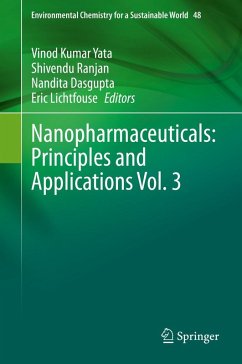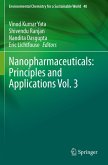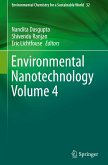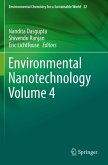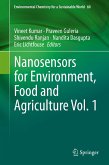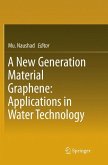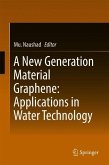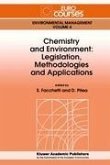Nanopharmaceuticals: Principles and Applications Vol. 3
Herausgegeben:Yata, Vinod Kumar; Ranjan, Shivendu; Dasgupta, Nandita; Lichtfouse, Eric
Nanopharmaceuticals: Principles and Applications Vol. 3
Herausgegeben:Yata, Vinod Kumar; Ranjan, Shivendu; Dasgupta, Nandita; Lichtfouse, Eric
- Gebundenes Buch
- Merkliste
- Auf die Merkliste
- Bewerten Bewerten
- Teilen
- Produkt teilen
- Produkterinnerung
- Produkterinnerung
This book is the third volume on this subject and focuses on the recent advances of nanopharmaceuticals in cancer, dental, dermal and drug delivery applications and presents their safety, toxicity and therapeutic efficacy. The book also includes the transport phenomenon of nanomaterials and important pathways for drug delivery applications. It goes on to explain the toxicity of nanoparticles to different physiological systems and methods used to assess this for different organ systems using examples of in vivo systems.
Andere Kunden interessierten sich auch für
![Nanopharmaceuticals: Principles and Applications Vol. 3 Nanopharmaceuticals: Principles and Applications Vol. 3]() Nanopharmaceuticals: Principles and Applications Vol. 3121,99 €
Nanopharmaceuticals: Principles and Applications Vol. 3121,99 €![Environmental Nanotechnology Volume 4 Environmental Nanotechnology Volume 4]() Environmental Nanotechnology Volume 481,99 €
Environmental Nanotechnology Volume 481,99 €![Environmental Nanotechnology Volume 4 Environmental Nanotechnology Volume 4]() Environmental Nanotechnology Volume 481,99 €
Environmental Nanotechnology Volume 481,99 €![Nanosensors for Environment, Food and Agriculture Vol. 1 Nanosensors for Environment, Food and Agriculture Vol. 1]() Nanosensors for Environment, Food and Agriculture Vol. 181,99 €
Nanosensors for Environment, Food and Agriculture Vol. 181,99 €![A New Generation Material Graphene: Applications in Water Technology A New Generation Material Graphene: Applications in Water Technology]() A New Generation Material Graphene: Applications in Water Technology161,99 €
A New Generation Material Graphene: Applications in Water Technology161,99 €![A New Generation Material Graphene: Applications in Water Technology A New Generation Material Graphene: Applications in Water Technology]() A New Generation Material Graphene: Applications in Water Technology161,99 €
A New Generation Material Graphene: Applications in Water Technology161,99 €![Chemistry and Environment: Legislation, Methodologies and Applications Chemistry and Environment: Legislation, Methodologies and Applications]() Sergio Facchetti (ed.) / Demetrio PiteaChemistry and Environment: Legislation, Methodologies and Applications249,99 €
Sergio Facchetti (ed.) / Demetrio PiteaChemistry and Environment: Legislation, Methodologies and Applications249,99 €-
-
-
This book is the third volume on this subject and focuses on the recent advances of nanopharmaceuticals in cancer, dental, dermal and drug delivery applications and presents their safety, toxicity and therapeutic efficacy. The book also includes the transport phenomenon of nanomaterials and important pathways for drug delivery applications. It goes on to explain the toxicity of nanoparticles to different physiological systems and methods used to assess this for different organ systems using examples of in vivo systems.
Produktdetails
- Produktdetails
- Environmental Chemistry for a Sustainable World 48
- Verlag: Springer / Springer International Publishing / Springer, Berlin
- Artikelnr. des Verlages: 978-3-030-47119-4
- 1st edition 2020
- Seitenzahl: 356
- Erscheinungstermin: 20. August 2020
- Englisch
- Abmessung: 241mm x 160mm x 24mm
- Gewicht: 743g
- ISBN-13: 9783030471194
- ISBN-10: 3030471195
- Artikelnr.: 58975619
- Herstellerkennzeichnung
- Books on Demand GmbH
- In de Tarpen 42
- 22848 Norderstedt
- info@bod.de
- 040 53433511
- Environmental Chemistry for a Sustainable World 48
- Verlag: Springer / Springer International Publishing / Springer, Berlin
- Artikelnr. des Verlages: 978-3-030-47119-4
- 1st edition 2020
- Seitenzahl: 356
- Erscheinungstermin: 20. August 2020
- Englisch
- Abmessung: 241mm x 160mm x 24mm
- Gewicht: 743g
- ISBN-13: 9783030471194
- ISBN-10: 3030471195
- Artikelnr.: 58975619
- Herstellerkennzeichnung
- Books on Demand GmbH
- In de Tarpen 42
- 22848 Norderstedt
- info@bod.de
- 040 53433511
Dr. Vinod Kumar Yata is an interdisciplinary researcher working at National Dairy Research Institute, Karnal, India. He worked as an Assistant professor at the Department of Biotechnology, Dr. B R Ambedkar National Institute of Technology Jalandhar, Punjab, India. He received his Ph.D. in Bio technology from Indian Institute of Technology Guwahati. He specializes in interdisciplinary research which includes Nanotechnology, Microfluidics, Biotechnology, Cancer biology and Bioinformatics. He has developed a microfluidic device for the separation of live and motile spermatozoa from cattle semen samples. He opened up a new avenue to prodrug enzyme therapy by introducing the nanocarriers for the delivery of non-mammalian prodrug activating enzymes. He elucidated the structural features and binding interactions of several bio molecules by in silico methods. He published several research papers in peer reviewed international journals and presented papers in several international conferences. Dr. Shivendu Ranjan is scientist at the Chaperon Biotech, SIDBI Centre, Indian Institute of Technology, Kanpur, India. He is also serving as a senior research associate, adjunct, at the Faculty of Engineering and Built Environment, University of Johannesburg, South Africa. His research interests include nanotechnology, nanomedicine, science policy and diplomacy.He is associate editor of Environmental Chemistry Letters and editorial board member of Biotechnology and Biotechnological Equipment. He has received 20 awards and honors. Dr. Nandita Dasgupta has vast working experience in nanoscience and is working as Assistant Professor at Department of Biotechnology, Institute of Engineering and Technology, Lucknow, India. She has worked on Mesenchymal stem cell derived exosomes for the treatment of uveitis. She has successfully engineered micro-vehicles for model drug molecules. Her areas of interest include nanomaterial fabrication and its applications in medicine, food, environment, agriculture and biomedical.She is the associate editor of Environmental Chemistry Letters. She has received several awards and recognitions from different national and international organizations. Dr. Eric Lichtfouse is an environmental chemist working at the University of Aix-Marseille, France. He has invented carbon-13 dating. He is teaching scientific writing and communication, and has published the book Scientific Writing for Impact Factors. He is founder and Chief Editor of scientific journals and series in environmental chemistry and agriculture. He got the Analytical Chemistry Prize from the French Chemical Society, the Grand Prize of the Universities of Nancy and Metz, and a Journal Citation Award by the Essential Indicators.
Chapter 1 Inorganic Nanomaterials for Enhanced Therapeutic Safety.- Chapter 2 Nanoparticles application for cancer diagnosis.- Chapter 3 Insights into nanotools for dental interventions.- Chapter 4 Nanopharmaceuticals: Synthesis, Characterization and Challenges.- Chapter 5 Electrospun Nanofibers as Carriers in Dermal Drug Delivery.- Chapter 6. Enzyme responsive and enzyme immobilized nanoplatforms for therapeutic delivery: an overview of research innovations and biomedical applications.- Chapter 7 Systemic Nanotoxicity and its Assessment in Animal Models.- Chapter 8 Dendrimers as drug carriers for cancer therapy.- Chapter 9 Nanoparticle design to improve transport across the intestinal barrier.- Chapter 10 Recent Progress in Nano-theranostic medicine.
Chapter 1 Inorganic Nanomaterials for Enhanced Therapeutic Safety.- Chapter 2 Nanoparticles application for cancer diagnosis.- Chapter 3 Insights into nanotools for dental interventions.- Chapter 4 Nanopharmaceuticals: Synthesis, Characterization and Challenges.- Chapter 5 Electrospun Nanofibers as Carriers in Dermal Drug Delivery.- Chapter 6. Enzyme responsive and enzyme immobilized nanoplatforms for therapeutic delivery: an overview of research innovations and biomedical applications.- Chapter 7 Systemic Nanotoxicity and its Assessment in Animal Models.- Chapter 8 Dendrimers as drug carriers for cancer therapy.- Chapter 9 Nanoparticle design to improve transport across the intestinal barrier.- Chapter 10 Recent Progress in Nano-theranostic medicine.

